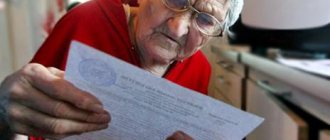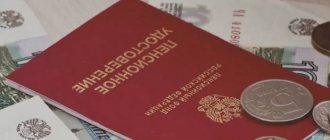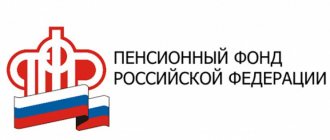The right of citizens to choose a direction
In accordance with current legislation, citizens have the right to send funds to finance simultaneously two types of labor software or only to the insurance part.
To implement the second option, it is necessary to formalize a waiver of the funded part of the pension. Today, persons born in 1967 and subsequent years, but no later than December 31, 2020, have the right to choose a direction. According to the law, the obligation to pay insurance premiums falls on the employer.
Note! Citizens born before 1967 also have the right to accumulate funds by making voluntary contributions to the personal account of the NPF (Non-State Pension Fund).
How to make an application
The application is filled out in free form, the main thing is to fill out all the data:
- address and name of the department where documents are submitted;
- the citizen's name without abbreviations;
- basic passport data;
- reasons for refusing a pension;
- date, signature and transcript.
Sample filling:
When it is not possible to ask for a representative, you can send copies of documents by mail. However, each of them must be certified, otherwise the copies will lose legal force.
The procedure for accumulating pensions
Insurance premiums, the amount of which depends on the amount of wages, are calculated as a percentage of the monthly salary without deducting taxes.
The higher the salary, the greater the contributions and, accordingly, the greater the retirement pension. Additional Information! In accordance with the requirements of the law, the tariff rate for contributions to the Pension Fund of the Russian Federation today is 22%. Regardless of the direction chosen by the employee, the distribution of withheld funds occurs as follows:
- 16% falls on the personal account of the insured person. This is his IT (individual tariff);
- the remaining 6% is called the solidarity tariff. These are funds intended to finance social benefits, in particular burial and other fixed payments.
If the employee has chosen only the insurance direction, all 16% will be used to complete the insurance coverage.
If contributions are directed to accumulation, the distribution of funds will be carried out as follows:
- 10% — insurance premium;
- 6% - accumulation.
The main sources of filling the storage part include:
- 6% of the IT of the insured employee, deposited into the account of the Pension Fund of the Russian Federation by the employer.
- Voluntary contributions of individuals made within the framework of the State Co-financing Program.
- Maternal capital. Only women can send funds.
- Investments.
Advantages and disadvantages of directions
Before making a final decision, it is necessary to become more familiar with the pros and cons of each direction. The table below will help you decide whether you should give up saving your pension or not.
| Insurance direction | Cumulative direction | |
| Advantages |
|
|
| Flaws |
|
Attention! The moratorium on the formation of a funded pension was extended until 2020, that is, all 16% of the insured employee’s IT is directed to the formation of insurance coverage.
Is it possible to refuse pension contributions and how to do it?
The legal reform that has entered into force allows Russians to form their pension in two ways:
- the employer pays the employee’s insurance premiums at his own expense;
- The citizen independently pays the funded part.
The first option provides for a direct relationship between a person’s salary without taking into account taxation. All payments are made at the expense of the enterprise. In the second option, a citizen can influence the size of his future pension.
Every citizen has the right to know that 6% of contributions go to the maintenance of state funds, and the remaining 16% participate in the formation of a pension on an individual basis. 10% consists of a fixed insurance part, and 6% - from a funded part.
The state does not give a citizen of the Russian Federation the right to refuse pension contributions, but he can shift this responsibility only to the employer.
Features of the procedure for refusing the funded part
It was necessary to make a decision on the formation of savings before 2020. To confirm his choice, the citizen had to submit a corresponding application to the Pension Fund or NPF. There is a certain category of citizens to whom insurance payments are assigned automatically.
These include:
- insured persons who previously chose to act as a manager with a 2 percent tariff rate that is not currently in effect;
- citizens who did not submit any applications and did not choose any of the directions.
Note!
Regardless of where the citizen submitted the application, he has the right to issue a waiver of the funded pension at any time. If you refuse to accumulate a pension, all funds from the employee’s IT will be used to finance insurance payments. Refusal to replenish a funded pension at the expense of IT does not prevent a citizen from depositing funds into the NPF account on a voluntary basis, for example, by transferring money from [anchor href=»lgoty-vsem.ru/mat-kapital/ispolzovanie/ispolzovanie-mk.html» ]maternity capital.
Where to contact
Before abandoning the accumulation of a pension, it is necessary to weigh all the pros and cons, since the possibility of returning to this direction is not provided for by law. To implement the plan, you must contact the Pension Fund with a corresponding application. Important! During the year following the submission of the application, the citizen has the right to change his mind and withdraw his application. In fact, this is the only option for returning to the possibility of forming a funded pension.
How to make an application
The application is drawn up in accordance with the norms and requirements of the law.
If a representative acts on behalf of the insured person, a power of attorney indicating the powers of the authorized representative must be attached to the application. For a power of attorney to have legal force, it must be notarized. You can also use an additional application option via mail.
Contributions to the Pension Fund are mandatory for everyone
Is it possible to refuse to pay contributions to the Pension Fund? The answer to this question is “no” if you are officially employed and do not receive a “black” salary, because these contributions are paid not by you, but by your employer, who is obliged to report to the Pension Fund of the Russian Federation so as not to cause serious trouble.
The exception is when employees are employed under an employment contract . In this case, the employer pays only income tax of 13%. But in such a situation, its employees face many risks associated with the inability to claim other insurance payments (disability pension, maternity capital), the inability to receive paid sick leave, and so on.
The only thing a citizen can do is to choose a pension insurance system with or without a funded component. When choosing a system with a funded component, a citizen submits appropriate applications to his employer and the Pension Fund.
After receiving a positive answer, he has the right to invest his funded pension funds in the pension market, and he can win or lose. But such a system also has advantages - in particular, in the event of a citizen’s death, his relatives will be able to inherit the unpaid insurance benefit.
Termination of pension payments
The right to receive a pension is automatically canceled in the following cases:
- if employees of the Pension Fund discover information that is sufficient to terminate payments;
- a disabled person received the payment, but the medical certificate expired;
- the payment was made in the event of the loss of a breadwinner, but the person who received it was declared incapacitated or he had reached the borderline age;
- if a citizen officially refuses to receive the insurance part of the pension payment.
Suspension of pension payments
Payment of a pension can be suspended not only on a voluntary basis. Suspension of the accrual and payment of pensions may occur in the following situations:
- loss of the right to a pension;
- non-receipt of pension payments by a pensioner;
- death of a pensioner.
The pensioner can restore the payment of the pension by eliminating the circumstances that led to the suspension of the pension.
Loss of the right to a pension by the recipient
A pensioner may lose the right to a pension depending on the conditions for granting a pension, as well as due to the occurrence of a certain situation
Let's look at some of them:
Situation 1. Termination of payment of a disability pension: removal of the disability group that was previously assigned to the pensioner after undergoing re-examination (confirmation) or the pensioner’s failure to appear for re-examination.
Situation 2. Termination of payment of a survivor's pension: after the pension recipient is recognized as able to work. The pension recipient has reached the age of 18 and has not provided the Pension Fund with documents confirming that the person is studying full-time.
Situation 3. Termination of pension payment after checking the accuracy of the documents provided: as a result of checking all the documents provided, it was established that these documents were fake, and the fact that the pensioner provided false information was revealed.
Situation 4. Termination of payments due to the pensioner moving to a permanent place of residence in a foreign country.
Payment of pensions is suspended based on the order of the Pension Fund. During the period of suspension, Pension Fund employees find out the reasons why the necessary documents were not provided and carry out work to request these documents from the pensioner himself.
Non-receipt of payments
The very fact that a pensioner has not received a pension is grounds for suspending future pension payments.
The procedure for suspending pension payments consists of several stages:
Stage 1. The pensioner did not show up to receive the pension, or the postman could not deliver the pension for six months, since the pensioner did not live at the specified address.
Stage 2. After six months of non-receipt of pension funds, from the 1st day of the month, the Pension Fund temporarily suspends pension payments. The pension fund is obliged to send a notice to the pensioner.
Stage 3. If, after six months from the moment of temporary suspension of pension payment, the pensioner has not applied to the Pension Fund, then the pension payment is completely suspended and a notification is sent.
Death of a pensioner
The death of a pensioner is the main factor in the termination of pension payments.
After death, the territorial branch of the registry office submits a death certificate to the Pension Fund. The death certificate is the main document for terminating the accrual and payment of a pension. In fact, the termination of payments occurs automatically, so the relatives of the pensioner do not need to contact the relevant structures.
Expert opinion
Zakharov Vasily Vladimirovich
Practicing lawyer with 6 years of experience. Specialization: family law. Legal expert. Vasily
Payment is suspended if the pensioner is declared missing or deceased; the payment of the pension is terminated. The basis is a court decision.
Pension payment termination period:
- the next month following the date of death of the pensioner indicated in the certificate;
- from the 1st day of the month following the month the court decision was made if the pensioner is considered missing.
After the death of a pensioner, relatives, as well as legal representatives, have the right to receive pension payments from the deceased.
Any citizen of Russia who is officially employed has the right to claim a legal pension after retirement, which is formed through pension contributions from the employer.
p, blockquote 1,0,0,0,0 —>
Some of us are ready to give up this right for a variety of reasons - from doubts about the reliability of the Pension Fund to doubts about our own ability to live until retirement.
p, blockquote 2,0,0,0,0 —>
p, blockquote 3,0,1,0,0 —>











